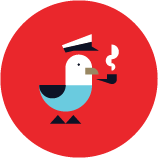To help you plan, we’re sharing some of our favorite destinations by region, including marinas that you can dock at along the way.
A Guide to Boat Ownership: What First Time Owners Should Know
Post by Team Dockwa - Published on 02/08/22 17:45 PM

Before you hit the high seas, you must be fully versed in the ins and outs of boat ownership. To help with this, we gathered some top tips for first-time boaters.
Purchase Boating Insurance
Nothing puts a damper on the day like damaging your new boat and then realizing you’re not insured. So the very first thing to do after buying your boat is to sign up for insurance, both for liability purposes and for accidental damage. Think of it like car insurance; you wouldn’t want to be on the road without it!

Discover Boating shared a few examples of boating insurance that you should consider when browsing for coverage:
-
A policy with specific fuel-spill liability would protect you from clean-up claims or third-party damage caused by the accidental discharge of oil or fuel if your boat were to leak fuel or sink in a marina.
-
If you have an accident while towing, your boat policy may pay to repair or replace the trailer as well as the boat.
Other insurance policies to keep in mind include coverage for boats in hurricane zones and boats leaving U.S. waters.
Learn the Laws of the Water
Just like when you drive your car, you need to learn the “rules of the water” before heading out. What’s true for one location may not be for another, so be sure to do your research and ask the marina you dock at about local rules and regulations.
Beyond this, it’s also essential to learn some basic boating terms that could help you when navigating over the radio or just talking with other boaters. Here is a guide with some helpful tips.
Fueling 101
You’re on the water and notice that your gas gauge is getting low. What do you do? Before refilling, stop and make sure you know what type of fuel your boat takes. Fun fact, most marine engines shouldn’t use motor fuel with more than 10 percent ethanol (E10). If you’re ever unsure how to pump, feel free to ask a marina employee to help.

Maintenance and Repairs
Let’s face it; your boat will receive some dings and scratches at some point in its life. Surveying your boat regularly and consistently keeping each part of it in tip-top shape will save you a lot of time (and money) down the road. A few easy items that BoatingGeeks suggests doing include flushing the boat’s motor with freshwater, rinsing salt or river water off your boat thoroughly before storing, and always keeping the interior of your boat tidy and clean to avoid injury.
Where to Store Your Boat
Depending on the size of the boat, storing it on a trailer is an easy option. That said, not all communities permit boats to be parked long-term in a residential driveway, so you need to consider where your vessel will “live” when not on the water. Check to see if your trailer can fit in your garage or backyard, and if not, there are many other storage options, from a dry stack valet service to an indoor boat storage facility.

Departure Checklists and Float Plans
You wouldn’t board an airplane if the pilot didn’t review the flight plans beforehand, right? So make sure you’re ready to sail, create and double-check a departure checklist to ensure you have everything you need for the day. Plus, make certain people know where you’re going and how best to reach you in case of emergency – this is called a float plan. If you’ve never filed a float plan before and want an example, use the US Coast Guard Auxiliary sample float plan.
Grab the Right Equipment
You’re going to need life jackets for anyone onboard your boat, but you should also have some other gear handy in case of emergencies. These items include fire extinguishers, visual and sound signaling devices, medical kits, and more. Always think about safety before setting sail – you always want to be ready for anything on the water.

Now that you have the boating basics down, you can feel confident when you set off on that first trip with your friends and family. Plus, once enough time has passed, you’ll be able to reverse the roles and teach another first-time boater everything you have learned along the way.
Stay safe and happy wandering!
Be sure to check out our other blog posts to get an inside look at our favorite destinations, marinas, and tips for first-time boaters. Join the conversation on Flipboard, Facebook, Twitter, and Instagram.



